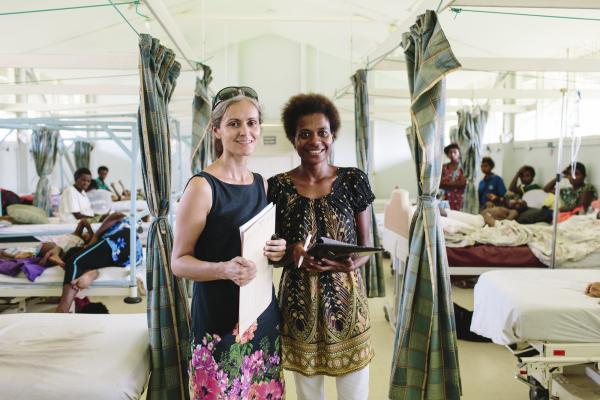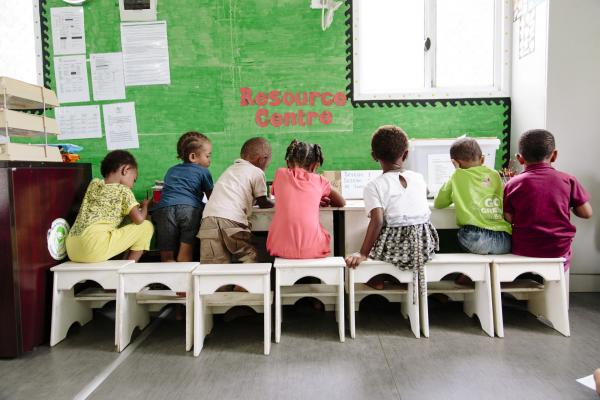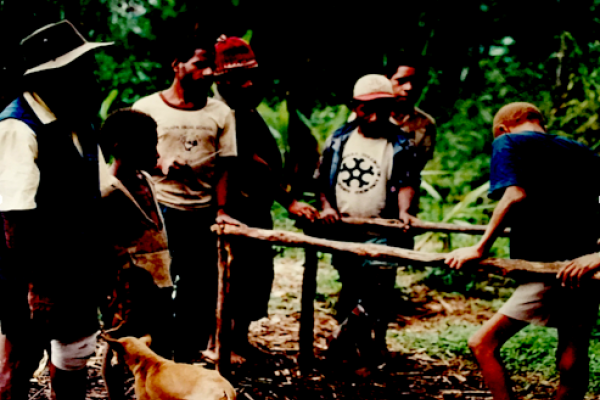As VSO scales back operations in PNG after more than 50 years, we celebrate just a handful of the major impacts volunteers from around the world have had on the development of this diverse Pacific nation.
1. Establishing the first specialist hospital unit for domestic violence survivors

It is thought that PNG has the highest levels of violence against women for a country not at war, with some studies suggesting nearly every woman and girl experiences violence in her life. VSO has taken many different approaches to tackling this issue over the years, from male-led advocacy, to female empowerment to community-based campaigns.
In 2015, VSO established the first Family Support Centre and specialised hospital unit at Modilon Provincial Hospital, Madang – an integrated treatment and intervention centre for victims and survivors of gender violence and child abuse.
Volunteer Catherine Bedford, a psychiatrist from the UK, was instrumental in setting up the unit including training local nurses and social workers. Her work led to survivors being referred to the centre where they could be offered specialised and sensitive care, which could even could include support with legal advice.
2. Breaking down stigma around HIV
HIV was known as “the disease without medicine”, and was very much a taboo subject in PNG when volunteer Charlie Taylor started his placement in 2013. People living with HIV and AIDS suffered discrimination and violence, meaning many kept their status secret and did not seek out treatment - unaware of the danger they were putting themselves in.
Charlie’s main challenge was to raise awareness about the importance of anti-retroviral therapy (ART) by working with community organisations. One of the many people he worked with was Steven, one of the first Highlanders to be diagnosed with HIV - and the first to disclose his status to the public.
Charlie worked with community groups and helped them plan and organise activities as well as supporting them to fundraise. This enabled outreach programmes to grow and increase awareness, encouraging people living with HIV to continue their medication. They broke down stigmas, and trained people with counselling skills. Over 600 people were trained and these networks still provide ongoing support to those living with HIV or AIDS.

3. Developing the first 'safe haven' libraries for vulnerable children
With more than 80 languages spoken, PNG is one of the most diverse countries on the planet. Lack of access to schools for some communities mean that here, literacy rates can be as low as 15%. About half as many women as men can read and write.
We used libraries as an innovative way to reach children who wouldn't otherwise have much access to books and schools. Volunteer Rowan Southwell worked with library staff to create lessons and educational resources for the children as part of the Buk Bilong Pikinini project.
The project has 16 libraries across the country, creating safe places for children in vulnerable communities to read and learn through interactive play. As well as providing a safe haven, the improved quality of the libraries help build literacy skills amongst children in the poorest communities.
4. Introducing rice to the Highlands
Peter Cradock arrived in PNG in 1999 just after a significant El Niño weather phenomenon which caused most root crops to fail.
Peter introduced rice to the Highlands which helped young islanders regain their livelihoods through agriculture and also transformed food security in this remote area.
Peter has since been back five times to PNG working on various projects with his wife, who he met through working in VSO’s London office.

5. Building the first community-based rehabilitation programme for people with disabilities
Joan Carey and her husband Martin helped transform Mount Hagen’s Handicapped Children’s Centre into a regional community-based rehabilitation (CBR) programme during the late 1980s. It was the first such programme in the country, proving an indispensable way to help the geographically scattered and rural community-based islanders living with disabilities. Simple acts such as introducing motorbikes and cars to visit people improved countless lives.
Their impact ranged from developing a training programme for staff, to teaching locals to build parallel bars for rehabilitation. They also raised the profile of people with disabilities in PNG, such as getting disabled children into the school system. Their legacy remains as these disability programmes continue to this day.
Thank you to all involved
To everybody involved in supporting vital development work in PNG over the past five decades - thank you.
Read more

A ripple of change: how VSO volunteers are transforming communities
Every act of volunteering begins with a choice — a decision to act out of a desire to make a difference. Across the world, VSO volunteers are proving that one spark of action can ignite something much bigger.

The two volunteers empowering girls and young women in Mozambique
Nelma and Carmirene and are two volunteers working on VSO's EAGLE project in Mozambique. For Nelma and Carmirene, education is not just about school, it is about meeting people where they are and using the right tools to challenging harmful norms. Here are their stories.
Opening doors to safety, education, and a brighter future
For girls in Karamoja, the poorest region in Uganda, being forced into early motherhood is all too common. This Christmas, you can open the doors to Safety, Education, and a Brighter Future.
